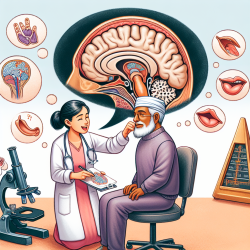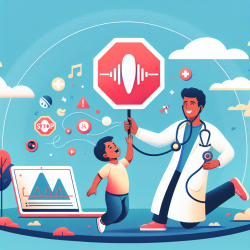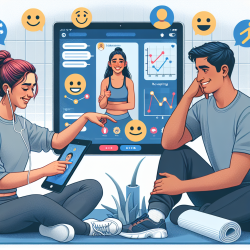In the realm of speech-language pathology and beyond, practitioners are increasingly recognizing the potential of technology to enhance caregiving. A recent study titled "Beyond instrumental support: Mobile application use by family caregivers of persons living with dementia" offers valuable insights into how mobile apps can be utilized effectively by caregivers. This blog will delve into the key findings of the research and provide actionable steps for practitioners to improve their skills and outcomes for children under their care.
Understanding the Study
The study employed a qualitative descriptive approach to explore the experiences of family caregivers using mobile apps in their caregiving roles. Five caregivers participated, each sharing their unique experiences and insights. The central theme that emerged was "Connecting to support through apps in my, your and our lives," which underscored the multifaceted benefits of app use for both caregivers and care recipients.
Key Findings
The study identified three core themes:
- Adapting Apps to Meet Individual Needs: Caregivers often adapted non-caregiving-specific apps for their needs. For example, reminder apps were used to manage medication schedules and appointments.
- Minimizing the Impact of the Condition: Apps helped maintain the care recipient's personhood and family routines, crucial for emotional and psychological well-being.
- Determining the Effectiveness of Apps: Caregivers valued apps that were simple, interactive, and integrative across multiple devices.
Practical Applications for Practitioners
Speech-language pathologists and other practitioners can draw several practical lessons from this study:
- Customizing Existing Apps: Just as caregivers adapted general apps for specific needs, practitioners can customize widely available apps for therapeutic purposes. For instance, reminder apps can be used to help children adhere to speech practice schedules.
- Promoting Social Connection: Apps that facilitate communication, such as video calling platforms, can be used to enhance social interactions for children with speech and language difficulties, promoting better outcomes.
- Evaluating App Effectiveness: Practitioners should focus on selecting apps that are user-friendly, offer clear navigation, and can be used across different devices to ensure consistent support.
Encouraging Further Research
The study highlights the importance of involving end-users in app development to ensure that the technology meets their needs effectively. Practitioners are encouraged to participate in or initiate research projects that explore the use of mobile apps in their specific fields. By doing so, they can contribute to the development of tailored solutions that enhance therapeutic outcomes.
Conclusion
The integration of mobile apps into caregiving and therapeutic practices offers significant potential to improve outcomes. By customizing existing apps, promoting social connections, and rigorously evaluating app effectiveness, practitioners can leverage technology to support their clients better. To read the original research paper, please follow this link:
Beyond instrumental support: Mobile application use by family caregivers of persons living with dementia.










